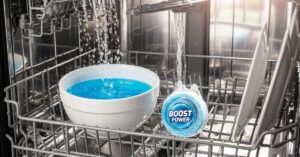Key Points
Clean the dishwasher filter monthly to remove trapped food debris and prevent odor buildup.
Run a hot cycle with white vinegar to dissolve grease and neutralize smells.
Wipe gasket seals with warm soapy water to stop mold and mildew growth.
Avoid standing water by checking and clearing the drain hose regularly.
Use a dishwasher cleaner monthly to maintain freshness and improve performance.
Eliminate that mystery dishwasher odor – and avoid future stink with these simple tips.
It’s sort of a peculiar riddle when that which cleans needs to be cleaned itself. It just goes to show that no matter how much we automate jobs, old-fashioned elbow grease is still the most honest technique. So if your dishwasher starts to emit an unsavory odor, that’s your cue to pitch in and give your magic chore robot a good scrub behind the ears.
That’s right, even your dishwasher needs a good clean now and again. We’ve broken it down to 5 easy steps that explain how to clean a smelly dishwasher (and we’ve even explained why you need to do all of this).
Is it normal for a dishwasher to smell?
If your dishwasher has a new plastic smell, this is normal and should dissipate in about two weeks. Try using affresh® dishwasher cleaner to help remove the odor.¹ If your dishwasher has a slight petroleum smell, this can also be normal. Some models have sound-deadening material that smells like petroleum; the smell usually dissipates in 4–6 weeks. A varnish smell can also be typical, as some motor windings are treated with a varnish. This smell should wear off in approximately one month.
If your dishwasher smells like fish or rotten food, you may have a clogged dishwasher drain or a dirty filter. A sewage or wet dog smell can point to a drainage problem, which may require professional inspection. For these types of smells, continue reading to learn more about their causes and potential fixes.
Why does my dishwasher smell?
Smelly dishwashers can have a few possible causes, including:
- A dirty or clogged filter
- Food residue on the interior walls
- Mold and/or mildew growth on the gasket seal
- A clogged drain
Fortunately, most of these causes have simple solutions that you can try yourself with the help of the proper tools and a little elbow grease.
Have a stainless steel dishwasher? Learn how to clean a stainless steel dishwasher the right way.
Tools to clean a smelly dishwasher
Dishwasher odor is not only an annoyance to your senses, but it can also reduce your appliance’s performance and lead to improperly cleaned dishes. Read the following troubleshooting tips to clean your smelly dishwasher.
Supplies
- White vinegar
- Dish soap
Tools
- Dishwasher-safe bowl
- Sponge
- Soft-bristled brush
- Clean, dry towel
How to clean the smelly dishwasher in 5 easy steps
Step 1: Empty the dishwasher

Before you begin, empty your dishwasher of any remaining dishes, glassware, and utensils for easier access to your dishwasher’s interior.
Step 2: Remove and clean the filter

Pull out the bottom dish rack and remove your dishwasher’s filter. Specific instructions for removing the filter can vary depending on the model, so be sure to consult your product manual before proceeding. Then, empty the filter of any debris and clean the filter by soaking it in warm, soapy water. For stuck-on particles, you can gently scrub the filter with a soft-bristled brush. Return the freshly cleaned filter to your dishwasher.
Own a Whirlpool®? See our guide on how to clean a Maytag dishwasher for brand-specific steps.
Step 3: Clean the dishwasher interior

Pour 2 cups of white vinegar into a dishwasher-safe bowl and place the bowl on the bottom rack of your empty dishwasher. Select a dishwasher cycle with an air-dry or energy-saving dry option and press start. During the cycle, the vinegar will mix with the wash water to help neutralize odors and clean your dishwasher. Once the wash cycle is complete, you can use your dishwasher as usual.
Step 4: Clean the gasket seals

Without regular maintenance, mold and mildew can grow in the crevices of your dishwasher’s gasket seals and can create a musty odor. Use a sponge and warm, soapy water to wipe away any buildup on the gasket seals, then wipe dry with a clean towel.
Step 5: Schedule a service with a licensed technician

If your dishwasher still smells bad after following the previous troubleshooting tips, you may have a clog in the drain hose. This is a more complicated problem that should be diagnosed and repaired by a professional. If you own a Whirlpool® dishwasher, you can visit the Whirlpool® service center to schedule a repair service for your Whirlpool® appliances.
How to avoid a smelly dishwasher
In most cases, you can help save your kitchen from a smelly dishwasher by following these simple maintenance tips:
- Clean the filter to avoid food particle buildup at least once a month.
- Avoid overstuffing the racks so that water and soap can easily pass through the dishes and break down debris.
- Use dishwasher cleaners, like this option from affresh®¹, once a month to reduce odor-causing residues.
Need help with a specific brand? Learn how to clean:
Create healthy dishwasher habits for your future self.
To avoid subsequent mystery odors and regain that “new dishwasher smell,” you can try the following tips:
- Try using Cascade Platinum Plus Action Pacs to wash your dishes regularly. It’s formulated to prevent hard water filming and keep the inside of your dishwasher looking fresh and clean.
- Be sure to scrape and rinse dishes carefully before loading them into the dishwasher.
- Run your dishwasher monthly with Cascade Dishwasher Cleaner, which goes a long way in the dishwasher stink prevention business.
- Try to avoid running other hot water appliances while using your dishwasher, so that its hot cycles are actually as piping hot as possible, which should kill pesky bacteria and discourage mold growth.
- Be sure you’re properly loading your dishwasher for the best results, including scraping them off pretty thoroughly and pre-rinsing if they’re especially gunky.
- Dishwashers should be cleaned quarterly (translation: every 3–4 months each year).
A little routine dishwasher maintenance goes a long way — just be sure to refer to your dishwasher manufacturer’s manual or guidelines when you clean, to keep your dishwasher in tip-top shape. You’ll forget your hard work is even paying off (and it will be!) because of the lack of any weird dishwasher smell. Your dishes (and your roommates) will thank you.
6 reasons your dishwasher smells & how to clean a smelly dishwasher
Dishwashers are an essential component of kitchen creativity, simplifying cleanup so you can spend more time making. However, they can become a source of frustration when they smell unpleasant. There are various reasons why your dishwasher may be emitting odors, including food debris, clogged filters, and drainage problems. Fortunately, there may be steps that you can take to tackle these issues and eliminate odors.
1. CLOGGED DISHWASHER FILTER
A dirty filter is usually the primary culprit behind unpleasant smells coming from your dishwasher. The filter in your dishwasher can accumulate food debris, which, without regular cleaning, can cause unwanted odors. A clogged filter can also hinder the proper cleaning of your dishes by recirculating dirty water.
POSSIBLE SOLUTION
To help restore your dishwasher’s freshness and eliminate odor, you should remove and clean or replace the filter. Check your owner’s manual for specific directions. Note that not all dishwasher filters need to be cleaned. If your dishwasher features a maintenance-free filter, this is not likely the cause of the smells.
2. GREASE BUILD-UP
Another issue that can cause an unpleasant odor in your dishwasher is grease buildup. Grease can accumulate in the drain and filter as well as the interior of the dishwasher.
POSSIBLE SOLUTION
Consider cleaning the interior of the dishwasher with affresh® dishwasher cleaner or another dishwasher cleaner. If the dishwasher is connected to a garbage disposal, be sure the knockout plug has been removed from the disposal inlet. Finally, clean the dishwasher filter and replace it. Consult your owner’s manual for more information.
3. DRAIN HOSE BROKEN OR LEAKING
The drain hose in your dishwasher plays a vital role in disposing of dirty water and food particles into the sink’s disposal unit. A malfunctioning drain hose can be the reason behind the unpleasant smell emanating from your dishwasher.
POSSIBLE SOLUTION
To help determine if this is the issue, simply remove the lower access panel and observe the condition of the floor. If the floor has been damaged by water or water is observed, a leak is likely present. In the event of a leak, you may need to seek the assistance of a professional.
4. LEFTOVER FOOD
Odors may occur from dirty dishes and food soils that fall into the tub or other parts of the dishwasher. Scraping dishes before loading, running regular cycles, and cleaning leftover food out of the dishwasher can help ensure that it smells fresh and your dishes come out clean.
POSSIBLE SOLUTION
If the dishwasher is not used daily, you can run a rinse cycle with the partial load until a full load is ready to be washed. Use affresh® dishwasher cleaner regularly to keep the dishwasher tub clean of soils. You can also run a vinegar rinse through the dishwasher by putting two cups of white vinegar in an upright glass measuring cup, or any dishwasher-safe container, in the lower rack. Run a regular cycle with no detergent and the dry option turned off.
5. STANDING WATER
Standing water in the dishwasher can cause a sewage smell. This can occur if your dishwasher has drainage problems. If this is the case, you might notice that the smell also comes from your kitchen sink drain since dishwashers are often connected to the same drain.
POSSIBLE SOLUTION
To solve drainage issues, there are a few things you can try. First, run a Normal cycle to see if it drains. If the dishwasher is connected to a garbage disposal, try running the disposal to make sure it isn’t clogged. Also, be sure the knockout plug has been removed from the disposal inlet. Check your owner’s manual for instructions on how to do this. You can also try cleaning your dishwasher’s drain basket, in case it has any food or debris in it that is preventing the dishwasher from draining.
6. MILDEW
The warm and moist environment created by your dishwasher can cause mildew. One area that is particularly susceptible to mildew growth is the gasket seal on the dishwasher door.
POSSIBLE SOLUTION
If your dishwasher smells, it’s recommended to inspect and clean the door’s seals using a damp cloth to remove any visible mold or mildew. You can also leave your dishwasher door slightly ajar when not in use or for a few hours after running a cycle. This can help improve air circulation and reduce moisture trapped inside.
Frequently Asked Questions: How to Clean a Smelly Dishwasher
1. Why does my dishwasher smell bad, and how can I fix it?
Odors are often caused by trapped food debris, mold/mildew, or stagnant water in the filter, spray arms, or gasket. Fix it by removing the filter, wiping crevices and seals, and running a vinegar cycle followed by a baking soda rinse.
2. How do I remove a rotten egg or sulfur smell from my dishwasher?
This smell usually comes from decaying food and bacterial buildup. Clean filters and hidden crevices, then run a vinegar cycle and sprinkle baking soda. For severe cases, inspect the drain hose or check for plumbing issues.
3. Can I use vinegar and baking soda together in the dishwasher?
Yes—but in separate cycles. Run one cycle with vinegar on the top rack, then another short hot cycle with baking soda sprinkled on the bottom. This removes buildup and neutralizes odors effectively.
4. How often should I clean my dishwasher filter to prevent odor?
Clean the filter at least once a month—more often if odor returns quickly. Regular cleaning prevents food residue and bacterial growth that cause smells.
5. Is standing water in the dishwasher causing the smell?
Yes, standing water creates a breeding ground for bacteria. Check for clogs in the drain hose or improper drainage configurations (such as missing the high loop). If unresolved, consult a technician.
6. Is mold or mildew causing the dishwasher odor, and how can it be cleaned?
Yes, mold often hides around the rubber gasket and corners. Use warm, soapy water or diluted vinegar to scrub wrinkled gasket areas with a toothbrush. Avoid bleach on stainless steel.
Final Thoughts
A smelly dishwasher can ruin the vibe in your kitchen, but the good news is—it’s almost always fixable. Now that you know how to clean a smelly dishwasher interiors, filters, and seals, regular upkeep should be a breeze. Doing small things like rinsing with vinegar and cleaning your filter every month can help. Remember to use cleaners that are safe for dishwashers and run hot cycles to avoid buildup. By taking a little time to care for it, you can stop bad smells and keep your dishwasher working well. Use these tips, and your food—and your nose—will be grateful.
Sources
https://www.whirlpool.com/blog/kitchen/dishwasher-smells-bad.html
https://www.homemadesimple.com/kitchen/how-to-get-rid-of-dishwasher-smells-5-easy-steps
https://merrymaids.com/blog/how-clean-smelly-dishwasher
https://www.mollymaid.com/practically-spotless/2019/july/how-to-clean-a-stinky-dishwasher
https://www.kitchenaid.com/pinch-of-help/major-appliances/why-does-my-dishwasher-smell.html
https://www.chefsresource.com/faq/how-to-eliminate-bad-smell-in-dishwasher
https://hometechbuddy.com/why-does-my-dishwasher-smell
https://www.southernliving.com/how-to-clean-dishwasher-6527038




